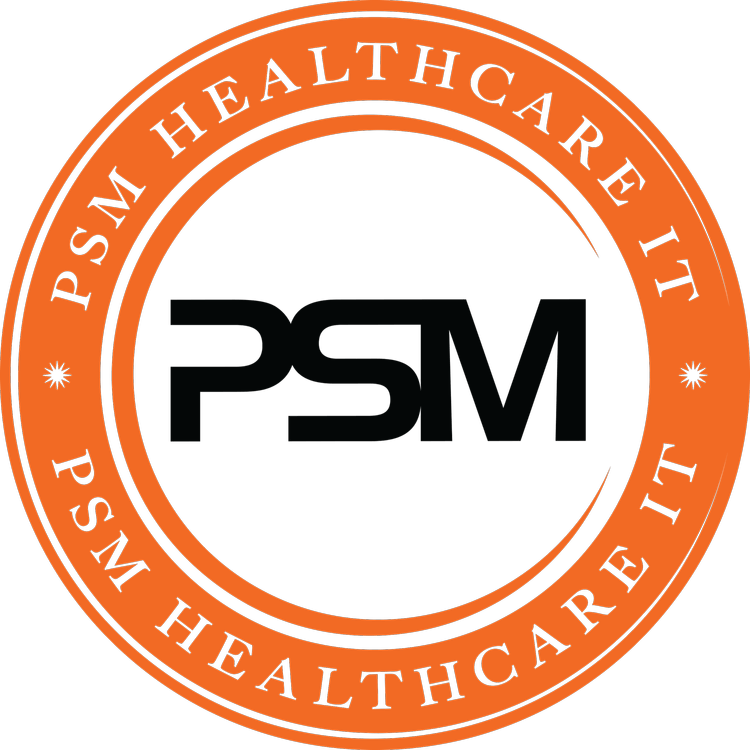HIPAA Training & Management
HIPAA Training & Management
Navigating the complex landscape of regulations can be daunting for small healthcare practices. At PSM Healthcare IT, we understand the challenges you face, and we’re here to help. Our comprehensive tools and resources are designed to ensure your practice remains compliant and secure. Don’t hesitate to call us for assistance.
Our services include:
• Establishing and implementing HIPAA compliance measures
• Performing HIPAA audits to identify and address any flaws before government audits
• Augmenting your existing IT staff with cybersecurity and compliance expertise
• Developing robust data backup plans and best practices
• Implementing strong password security policies and protocols
• Deploying and monitoring advanced anti-malware protection
• Ensuring proper facility access controls and physical security measures
With our experienced team by your side, you can focus on delivering exceptional patient care while we handle the complexities of regulatory compliance and cybersecurity. Contact us today to safeguard your practice and gain peace of mind.
Lets take a deeper dive.
In the world of healthcare, staying compliant with HIPAA regulations and guidance is crucial. Proper HIPAA training and management are essential for safeguarding sensitive patient information. Understanding the ins and outs of HIPAA ensures that healthcare professionals handle data securely and maintain patient privacy. This blog post delves into the significance of HIPAA training and management, providing insights on how to navigate this complex regulatory landscape effectively.
Key Takeaways
Understanding HIPAA basics is crucial for both individuals and organizations to ensure compliance with healthcare privacy regulations.
HIPAA training, a course, provides essential knowledge on safeguarding protected health information (PHI) and is a fundamental aspect of compliance.
Compliance requirements under HIPAA include maintaining the confidentiality, integrity, and availability of PHI.
It is mandatory for healthcare providers, health plans, healthcare clearinghouses, and their business associates to comply with HIPAA regulations.
Knowing how HIPAA works, including the Privacy Rule, Security Rule, and Breach Notification Rule, is vital for upholding patient privacy and data security.
Both individual employees and entire organizations play key roles in maintaining HIPAA compliance through proper training, policies, and procedures.
HIPAA Basics
Importance of Privacy
Privacy plays a critical role in healthcare by safeguarding patient information from unauthorized access. Healthcare providers have legal and ethical obligations to protect patient privacy under HIPAA. Breaches can result in hefty fines, legal actions, and damage to reputation.
Understanding HIPAA
HIPAA focuses on ensuring the confidentiality, integrity, and availability of patient information. The law has evolved since its enactment in 1996 to adapt to technological advancements and address emerging privacy concerns. Key components of HIPAA compliance include privacy rules, security rules, and breach notification requirements.
Significance in Healthcare
HIPAA has significantly transformed the healthcare industry by setting standards for the secure handling of patient data. It has compelled healthcare organizations to implement robust data management practices to safeguard sensitive information. Compliance with HIPAA not only ensures legal adherence but also enhances trust with patients and improves overall data security.
HIPAA Training Overview
Training Essentials
HIPAA training programs consist of essential components such as privacy rules, security rules, and breach notification protocols. These programs educate healthcare staff on handling patient information securely. Regular training is crucial to ensure staff awareness of HIPAA regulations and reduce the risk of breaches. Examples of training methods include online courses, workshops, and seminars. Resources like webinars, training manuals, and interactive modules are also available.
Compliance Necessities
HIPAA compliance requires organizations to implement policies for data security, employee training, risk assessment, and breach response. Non-compliance can lead to severe penalties such as fines and legal actions. To maintain continuous compliance with HIPAA, organizations should conduct regular audits, update policies according to regulatory changes, and provide ongoing staff training. Implementing secure technologies and encryption methods is also vital for protecting patient data.
Training Benefits
Investing in HIPAA training offers numerous benefits such as improved data security measures, reduced risks of breaches, and enhanced patient trust. Through training, healthcare staff learn to handle sensitive information responsibly, ensuring patient confidentiality. A well-trained workforce can contribute to a positive reputation for the organization by demonstrating commitment to compliance standards. Improved staff knowledge leads to better decision-making regarding patient care and data protection.
Compliance Requirements
Individual Needs
Healthcare professionals require tailored HIPAA training to meet specific compliance needs efficiently. Selecting relevant courses is crucial for personalized learning experiences. Opting for individualized programs ensures focused training on key compliance aspects.
Organizational Needs
Organizations must prioritize comprehensive HIPAA training across all levels to ensure compliance. Implementing training programs organization-wide fosters a culture of adherence. Leadership plays a pivotal role in driving and reinforcing a compliance-focused environment.
Security Measures
HIPAA compliance mandates the implementation of robust security measures to protect sensitive data. Safeguarding electronic protected health information (ePHI) is paramount. Examples include encryption, access controls, regular audits, and staff training on security protocols.
Who Must Comply
Covered Entities
Covered entities under HIPAA regulations refer to healthcare providers, health plans, and healthcare clearinghouses. Their primary responsibility is safeguarding patient information to ensure privacy and security. These entities must comply with HIPAA rules to protect sensitive health data.
Pros: Ensures patient confidentiality, promotes trust in the healthcare system.
Cons: Requires additional resources for compliance, strict penalties for violations.
Being classified as a covered entity carries significant implications. It entails legal obligations to maintain the confidentiality of patient records and secure electronic health information. Violating HIPAA regulations can result in severe penalties and damage to an organization’s reputation.
Business Associates
Business associates play a crucial role in handling protected health information on behalf of covered entities. They include third-party service providers such as billing companies or IT support firms. Business associates must adhere to HIPAA regulations and sign agreements outlining their responsibilities.
Establishing secure partnerships with business associates is vital for ensuring the protection of patient data.
Non-compliance by business associates can lead to legal consequences for both parties involved.
The obligations of business associates involve safeguarding patient information, implementing security measures, and reporting any breaches promptly. Their compliance is essential in maintaining the integrity of the healthcare ecosystem and upholding patient trust.
How HIPAA Works
Privacy Protections
HIPAA guarantees strict privacy protections for patient health information, ensuring confidentiality and security. Patients have rights to access their health records, request corrections, and control who can view their information. Healthcare providers comply by implementing policies and procedures to safeguard patient privacy.
Patients can trust that their sensitive health data is kept confidential under HIPAA regulations. Healthcare professionals must obtain patient consent before disclosing any medical information to third parties. This ensures that individuals have control over how their data is used and shared.
Healthcare providers utilize various methods to maintain patient privacy in line with HIPAA guidelines. This includes training staff on handling confidential information, using secure communication channels, and regularly auditing systems for compliance.
Security Framework
HIPAA mandates a robust security framework to protect electronic health records from unauthorized access or breaches. Technical safeguards such as encryption and authentication protocols are essential for securing ePHI (electronic protected health information).
Administrative safeguards involve policies and procedures that govern the use and disclosure of patient data. Physical safeguards focus on controlling access to facilities where patient information is stored, ensuring only authorized personnel can enter restricted areas.
To comply with HIPAA’s security requirements, healthcare organizations must conduct regular risk assessments, implement security measures like firewalls and antivirus software, and provide ongoing staff training on data security best practices.
Data Management
Effective data management practices are crucial for securely handling healthcare information in accordance with HIPAA standards. Encryption plays a key role in protecting data both at rest and in transit, preventing unauthorized individuals from accessing sensitive patient records.
Access controls are another vital aspect of data management, limiting who can view or modify specific pieces of information within a healthcare organization’s systems. By assigning unique user IDs and passwords, organizations can track user activity and prevent unauthorized data breaches.
Healthcare providers often rely on advanced data management tools like electronic health record (EHR) systems, secure messaging platforms, and identity verification solutions to streamline operations while maintaining compliance with HIPAA regulations.
Individual Compliance
Rights and Responsibilities
Patients have the right to access their health information, request corrections, and receive an account of disclosures. They can also request restrictions on certain uses or disclosures of their data. Healthcare providers must safeguard patient data by implementing security measures like encryption and access controls.
Healthcare providers are responsible for maintaining the confidentiality of patient information, ensuring it is only accessed by authorized personnel. They must provide patients with a Notice of Privacy Practices outlining how their information will be used and disclose any breaches promptly. Ethically, providers must respect patient autonomy and privacy while ensuring data accuracy.
When it comes to ethical considerations, healthcare providers must uphold patient confidentiality and trust. Patients have the right to make informed decisions about their care based on accurate information. Providers should prioritize transparency and honesty in their interactions with patients to maintain ethical standards.
Reporting Violations
Reporting HIPAA violations involves documenting the incident, notifying the designated HIPAA compliance officer, and following internal reporting procedures. It is crucial to report violations promptly to mitigate potential harm to patients and prevent further breaches.
Failure to report violations promptly can lead to legal consequences, including fines and sanctions against healthcare organizations or individuals involved in the violation. Timely reporting demonstrates a commitment to accountability and transparency in upholding HIPAA regulations.
Maintaining transparency in reporting violations involves educating staff on reporting procedures, encouraging a culture of compliance, and conducting regular audits to identify potential issues proactively. Accountability ensures that all parties involved take responsibility for their actions and work towards preventing future violations.
Organizational Compliance
Implementing Protections
Implement robust security protections by encrypting sensitive data and restricting access to authorized personnel only. Regularly update software and conduct employee training on cybersecurity best practices. Conduct regular risk assessments to identify vulnerabilities and address them promptly.
To enhance security, healthcare organizations should prioritize security audits to evaluate their systems’ effectiveness. These audits help in identifying weaknesses and ensuring compliance with HIPAA regulations. Implement multi-factor authentication and data encryption to safeguard patient information.
Continuous improvement is key in maintaining strong security measures. Healthcare settings must regularly review and update their security protocols based on emerging threats. Encourage employees to report any suspicious activities promptly for swift action.
Compliance Strategies
Achieving and maintaining HIPAA compliance requires a comprehensive approach. Develop clear policies and procedures that align with HIPAA regulations and train all staff members accordingly. Regularly update these policies to reflect changes in regulations.
Proactive compliance monitoring involves conducting internal audits to identify gaps in compliance early on. Regular training sessions can help employees stay updated on the latest regulatory requirements, reducing the risk of violations. Tailor compliance strategies based on the specific needs of different healthcare environments.
Effective strategies include appointing a dedicated compliance officer responsible for overseeing all compliance efforts. Implement regular checks and balances to ensure ongoing adherence to HIPAA guidelines. Utilize technology solutions like automated monitoring tools for real-time compliance tracking.
Audit Readiness
Audit readiness refers to the state of being prepared for potential audits or inspections by regulatory bodies. Maintain detailed documentation of all security measures, training sessions, and incident response protocols for audit purposes. Regularly review and update these documents as needed.
Preparing for audits involves conducting internal assessments to identify areas that may raise concerns during an audit. Address any non-compliance issues promptly to avoid penalties or sanctions from regulatory agencies. Train staff members on how to respond during an audit scenario effectively.
During regulatory audits, ensure all necessary documentation is readily accessible for auditors’ review. Conduct mock audits internally to simulate real audit scenarios and identify areas needing improvement. Collaborate with legal counsel or compliance experts for guidance on navigating audit processes effectively.
Final Remarks
Now that you understand the basics of HIPAA, the training requirements, compliance standards, and who needs to adhere to them, it’s clear that both individual and organizational compliance is crucial. Ensuring that you and your team are well-versed in HIPAA regulations not only protects sensitive patient information but also safeguards your organization from potential breaches and penalties.
Take the necessary steps to implement robust HIPAA training and management practices within your organization. Stay informed about updates in regulations, conduct regular audits, and prioritize data security. By doing so, you not only demonstrate your commitment to ethical healthcare practices but also build trust with patients and stakeholders. Remember, compliance is an ongoing process that requires diligence and dedication from everyone involved.
Frequently Asked Questions
What are the key components of HIPAA Basics?
HIPAA Basics include safeguarding Protected Health Information (PHI), ensuring privacy, and implementing security measures to protect patient data.
Who needs HIPAA Training?
All healthcare professionals, employees handling PHI, business associates, and anyone involved in healthcare operations must undergo HIPAA training.
What are the Compliance Requirements for HIPAA?
Compliance involves maintaining confidentiality, integrity, and availability of PHI, conducting risk assessments regularly, and implementing appropriate security measures.
How does Individual Compliance with HIPAA work?
Individuals must understand their role in protecting patient information, follow policies and procedures, report any breaches or violations promptly, and stay updated on HIPAA regulations.
What is Organizational Compliance under HIPAA?
Organizational compliance requires establishing a culture of privacy and security, appointing a Privacy Officer, conducting regular training sessions for staff, and implementing robust data protection measures.





